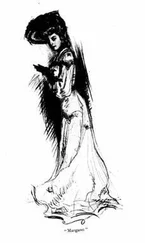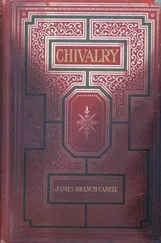James Cabell - The Rivet in Grandfather's Neck. A Comedy of Limitations
Здесь есть возможность читать онлайн «James Cabell - The Rivet in Grandfather's Neck. A Comedy of Limitations» весь текст электронной книги совершенно бесплатно (целиком полную версию без сокращений). В некоторых случаях можно слушать аудио, скачать через торрент в формате fb2 и присутствует краткое содержание. Жанр: Фэнтези, на английском языке. Описание произведения, (предисловие) а так же отзывы посетителей доступны на портале библиотеки ЛибКат.
- Название:The Rivet in Grandfather's Neck. A Comedy of Limitations
- Автор:
- Жанр:
- Год:неизвестен
- ISBN:нет данных
- Рейтинг книги:3 / 5. Голосов: 1
-
Избранное:Добавить в избранное
- Отзывы:
-
Ваша оценка:
- 60
- 1
- 2
- 3
- 4
- 5
The Rivet in Grandfather's Neck. A Comedy of Limitations: краткое содержание, описание и аннотация
Предлагаем к чтению аннотацию, описание, краткое содержание или предисловие (зависит от того, что написал сам автор книги «The Rivet in Grandfather's Neck. A Comedy of Limitations»). Если вы не нашли необходимую информацию о книге — напишите в комментариях, мы постараемся отыскать её.
The Rivet in Grandfather's Neck. A Comedy of Limitations — читать онлайн бесплатно полную книгу (весь текст) целиком
Ниже представлен текст книги, разбитый по страницам. Система сохранения места последней прочитанной страницы, позволяет с удобством читать онлайн бесплатно книгу «The Rivet in Grandfather's Neck. A Comedy of Limitations», без необходимости каждый раз заново искать на чём Вы остановились. Поставьте закладку, и сможете в любой момент перейти на страницу, на которой закончили чтение.
Интервал:
Закладка:
Her face had altered into a pink and white penitence which was flavored with awe.
"I—I forgot," she murmured, contritely; "I—forgot you were—like him—about your genealogies, you know. Oh, Olaf, I'm very silly! Of course, it is tremendously fine and—and nice, I dare say, if you like it,—to devote your life to learning, as you and he have done. I forgot, Olaf. Still, I am sorry, somehow, for that beautiful boy," she ended, with a disconsolate glance at the portrait.
VII
Long after Miss Stapylton had left him, the colonel sat alone in his study, idle now, and musing vaguely. There were no more addenda concerning the descendants of Captain Thomas Osborne that night.
At last, the colonel rose and threw open a window, and stood looking into the moonlit garden. The world bathed in a mist of blue and silver. There was a breeze that brought him sweet, warm odors from the garden, together with a blurred shrilling of crickets and the conspiratorial conference of young leaves.
"Of course, it is tremendously fine and—and nice, if you like it," he said, with a faint chuckle. "I wonder, now, if I do like it?"
He was strangely moved. He seemed, somehow, to survey Rudolph Musgrave and all his doings with complete and unconcerned aloofness. The man's life, seen in its true proportions, dwindled into the merest flicker of a match; he had such a little while to live, this Rudolph Musgrave! And he spent the serious hours of this brief time writing notes and charts and pamphlets that perhaps some hundred men in all the universe might care to read—pamphlets no better and no more accurate than hundreds of other men were writing at that very moment.
No, the capacity for originative and enduring work was not in him; and this incessant compilation of dreary footnotes, this incessant rummaging among the bones of the dead—did it, after all, mean more to this Rudolph Musgrave than one full, vivid hour of life in that militant world yonder, where men fought for other and more tangible prizes than the mention of one's name in a genealogical journal?
He could not have told you. In his heart, he knew that a thorough digest of the Wills and Orders of the Orphans' Court of any county must always rank as a useful and creditable performance; but, from without, the sounds and odors of Spring were calling to him, luring him, wringing his very heart, bidding him come forth into the open and crack a jest or two before he died, and stare at the girls a little before the match had flickered out.
At this time he heard a moaning noise. The colonel gave a shrug, sighed, and ascended to his sister's bedroom. He knew that Agatha must be ill; and that there is no more efficient quietus to wildish meditations than the heating of hot-water bottles and the administration of hypnotics he had long ago discovered.
PART TWO - RENASCENCE
"As one imprisoned that hath lain alone
And dreamed of sunlight where no vagrant gleam
Of sunlight pierces, being freed, must deem
This too but dreaming, and must dread the sun
Whose glory dazzles,—even as such-an-one
Am I whose longing was but now supreme
For this high hour, and, now it strikes, esteem
I do but dream long dreamed-of goals are won.
"Phyllis, I am not worthy of thy love.
I pray thee let no kindly word be said
Of me at all, for in the train thereof,
Whenas yet-parted lips, sigh-visited,
End speech and wait, mine when I will to move,
Such joy awakens that I grow afraid."
I
They passed with incredible celerity, those next ten days—those strange, delicious, topsy-turvy days. To Rudolph Musgrave it seemed afterward that he had dreamed them away in some vague Lotus Land—in a delectable country where, he remembered, there were always purple eyes that mocked you, and red lips that coaxed you now, and now cast gibes at you.
You felt, for the most part of your stay in this country, flushed and hot and uncomfortable and unbelievably awkward, and you were mercilessly bedeviled there; but not for all the accumulated wealth of Samarkand and Ind and Ophir would you have had it otherwise. Ah, no, not otherwise in the least trifle. For now uplifted to a rosy zone of acquiescence, you partook incuriously at table of nectar and ambrosia, and noted abroad, without any surprise, that you trod upon a more verdant grass than usual, and that someone had polished up the sun a bit; and, in fine, you snatched a fearful joy from the performance of the most trivial functions of life.
Yet always he remembered that it could not last; always he remembered that in the autumn Patricia was to marry Lord Pevensey. She sometimes gave him letters to mail which were addressed to that nobleman. He wondered savagely what was in them; he posted them with a vicious shove; and, for the time, they caused him acute twinges of misery. But not for long; no, for, in sober earnest, if some fantastic sequence of events had made his one chance of winning Patricia Stapylton dependent on his spending a miserable half-hour in her company, Rudolph Musgrave could not have done it.
As for Miss Stapylton, she appeared to delight in the cloistered, easy-going life of Lichfield. The quaint and beautiful old town fell short in nothing of her expectations, in spite of the fact that she had previously read John Charteris's tales of Lichfield,—"those effusions which" (if the Lichfield Courier-Herald is to be trusted) "have builded, by the strength and witchery of record and rhyme, romance and poem, a myriad-windowed temple in Lichfield's honor—exquisite, luminous, and enduring—for all the world to see."
Miss Stapylton appeared to delight in the cloistered easy-going life of Lichfield,—that town which was once, as the outside world has half-forgotten now, the center of America's wealth, politics and culture, the town to which Europeans compiling "impressions" of America devoted one of their longest chapters in the heyday of Elijah Pogram and Jefferson Brick. But the War between the States has changed all that, and Lichfield endures to-day only as a pleasant backwater.
Very pleasant, too, it was in the days of Patricia's advent. There were strikingly few young men about, to be sure; most of them on reaching maturity had settled in more bustling regions. But many maidens remained whom memory delights to catalogue,—tall, brilliant Lizzie Allardyce, the lovely and cattish Marian Winwood, to whom Felix Kennaston wrote those wonderful love-letters which she published when he married Kathleen Saumarez, the rich Baugh heiresses from Georgia, the Pride twins, and Mattie Ferneyhaugh, whom even rival beauties loved, they say, and other damsels by the score,—all in due time to be wooed and won, and then to pass out of the old town's life.
Among the men of Rudolph Musgrave's generation—those gallant oldsters who were born and bred, and meant to die, in Lichfield,—Patricia did not lack for admirers. Tom May was one of them, of course; rarely a pretty face escaped the tribute of at least one proposal from Tom May. Then there was Roderick Taunton, he with the leonine mane, who spared her none of his forensic eloquence, but found Patricia less tractable than the most stubborn of juries. Bluff Walter Thurman, too, who was said to know more of Dickens, whist and criminal law than any other man living, came to worship at her shrine, as likewise did huge red-faced Ashby Bland, famed for that cavalry charge which history-books tell you that he led, and at which he actually was not present, for reasons all Lichfield knew and chuckled over. And Courtney Thorpe and Charles Maupin, doctors of the flesh and the spirit severally, were others among the rivals who gathered about Patricia at decorous festivals when, candles lighted, the butler and his underlings came with trays of delectable things to eat, and the "nests" of tables were set out, and pleasant chatter abounded.
Читать дальшеИнтервал:
Закладка:
Похожие книги на «The Rivet in Grandfather's Neck. A Comedy of Limitations»
Представляем Вашему вниманию похожие книги на «The Rivet in Grandfather's Neck. A Comedy of Limitations» списком для выбора. Мы отобрали схожую по названию и смыслу литературу в надежде предоставить читателям больше вариантов отыскать новые, интересные, ещё непрочитанные произведения.
Обсуждение, отзывы о книге «The Rivet in Grandfather's Neck. A Comedy of Limitations» и просто собственные мнения читателей. Оставьте ваши комментарии, напишите, что Вы думаете о произведении, его смысле или главных героях. Укажите что конкретно понравилось, а что нет, и почему Вы так считаете.



